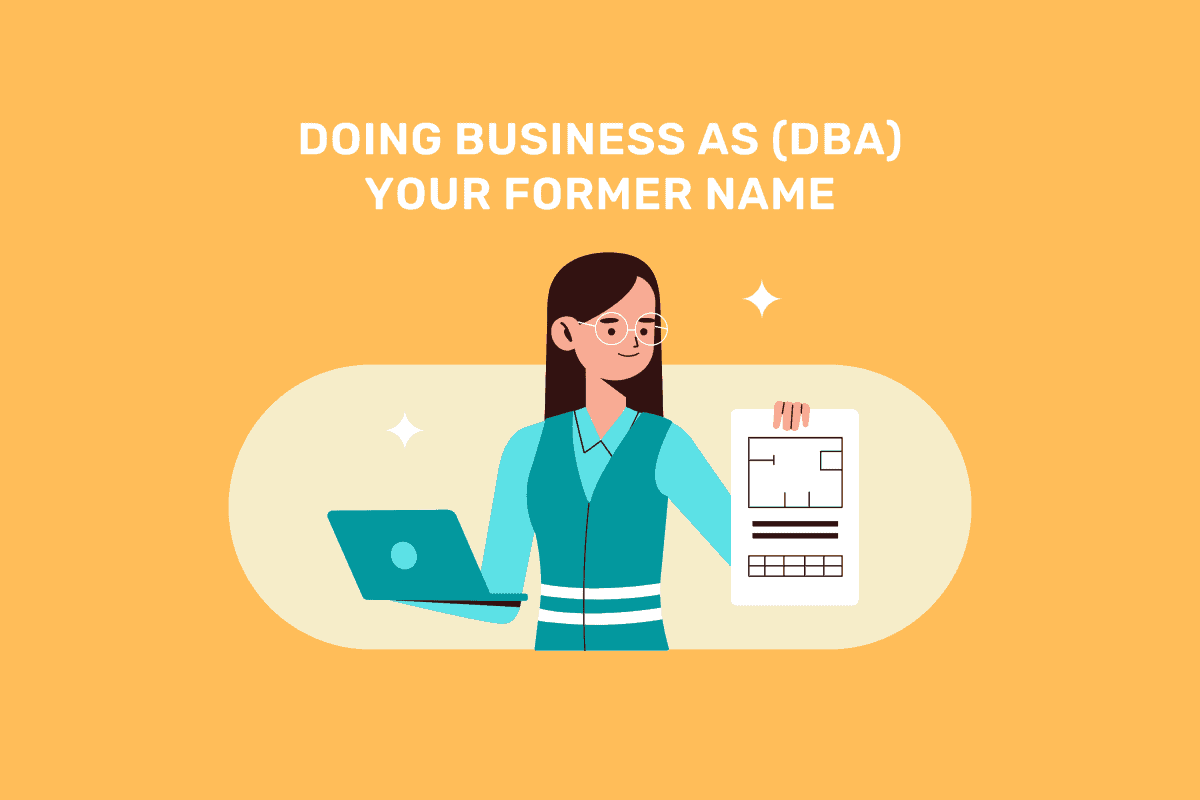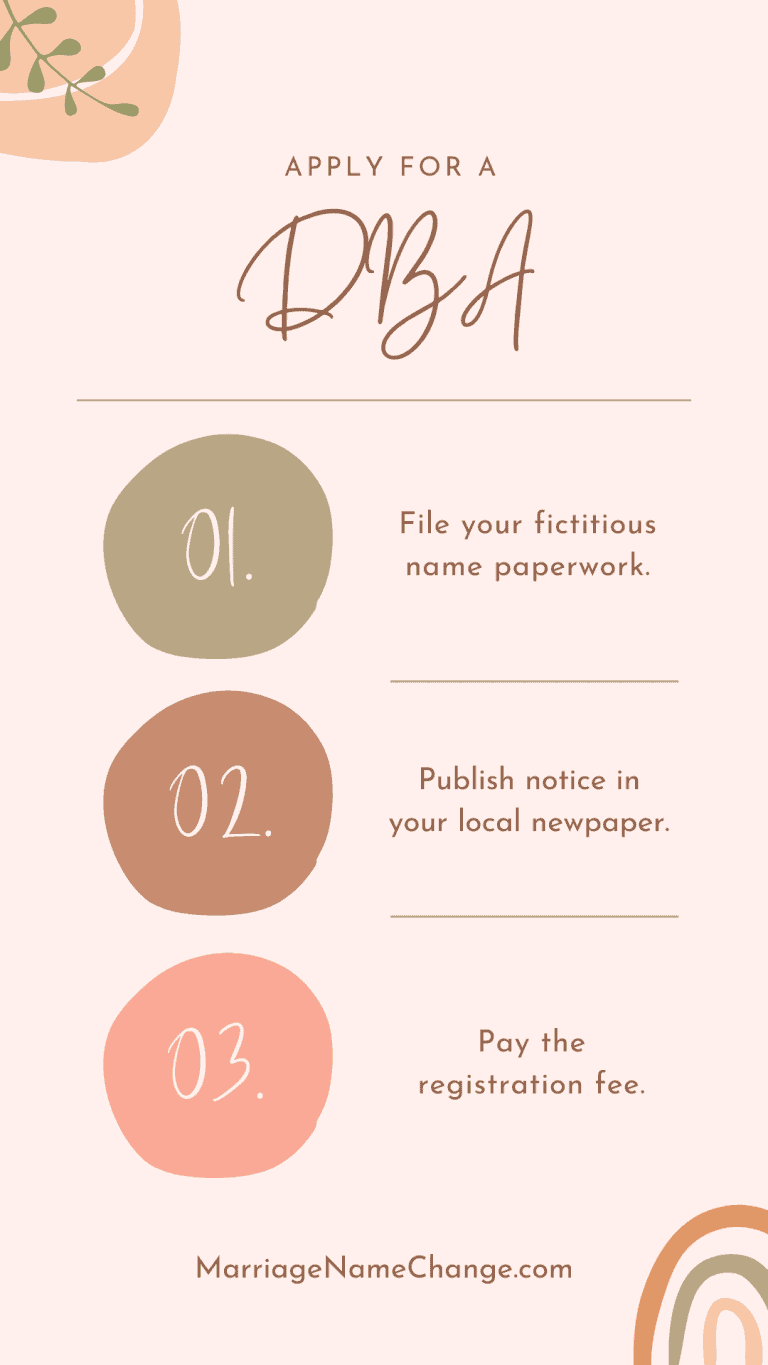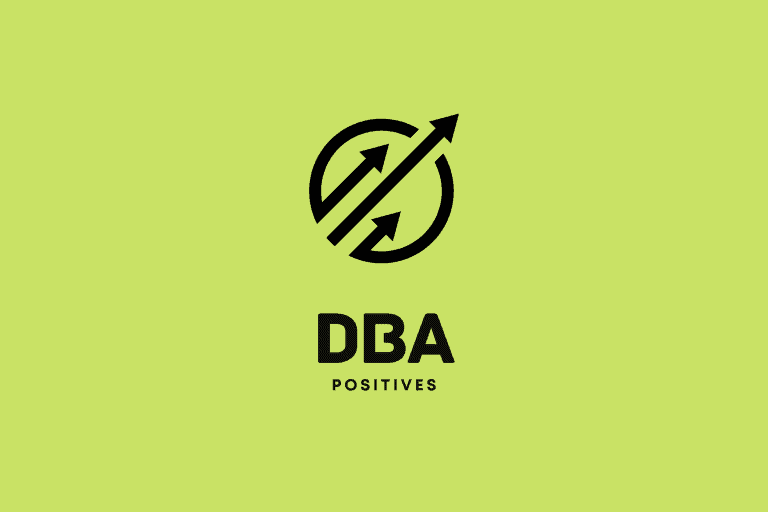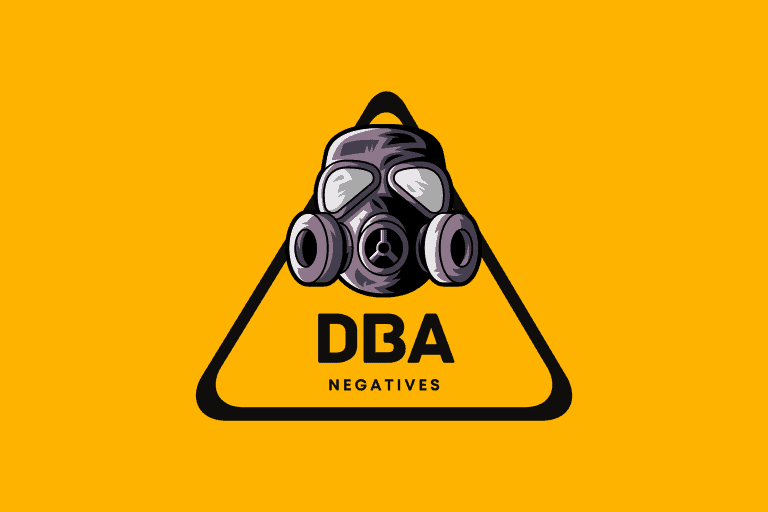Doing Business As (DBA) Your Birth, Former, or Maiden Name

Taking your partner's name can certainly be an exciting idea. You're sharing their history and a part of themselves, all with one simple change. It can create a genuine sense of family between you and your partner and lead you to the next step in your journey together.
Of course, even with this newfound joy in your life, you may still want to separate your professional and personal lives from one another. This uncoupling can extend to your name as well. If you've recently married or entered a domestic partnership and changed your name, you might think that you'll have to change your name on everything afterwards, too.
That alone can be a tedious exercise. And sometimes you just don't have that kind of time or drive to do so. Building up a career and reputation for yourself demands recognition of your maiden name or former name. Imagine if Wendy's suddenly changed their name to Burger Shack or something less iconic. Your name and career work the same way.
Indeed, some newlyweds may be more hesitant to change their name during marriage. Doing so may put you back at square one, career-wise, and no one wants to have all their hard work flushed down the drain. This can be a stressful professional and emotional tug of war.
Fortunately, there's a solution to this dilemma: use a DBA. DBAs are a somewhat tricky topic that requires a rigorous breakdown to explain what they are, how you can start using one, and the various pros, cons, and pitfalls associated with employing one.
Note: This article isn't just for maiden names and women. Men are covered too. Anyone can apply these DBA principles to their birth name or any former legal name held (e.g., prior married name, adoptive name, etc).
What is a DBA?
DBA is short for "Doing Business As," referring to the use of your birth or any other former name as the name you do business under. A DBA name allows you to use your maiden name or other former name as your fictitious business name while allowing you to keep using your married name in your personal life. It creates a crucial divide that allows you to conduct business as usual.
The term "fictitious business name" might sound confusing. Your birth name isn't fictional, even if you legally change it on your social security card. "Fictitious" refers to any business name that doesn't contain the legal surname of the owner or any extra phrases that implies additional owners (e.g., [Last Name] Company, [Last Name] and Associates, etc.).
In the case of DBAs, your birth name or former name is considered fictitious because it's technically not your legal surname. Fictitious business names may also be referred to as a "trade name" or "assumed name."
And your DBA doesn't have to be a person's name (past or present). It can be a made up phrase. This allows a person or company to conduct business under a name other than their legal name.
You might also be unsure of when exactly to file a DBA. If your small business uses your first name in the title (e.g., Jacob's Cupcakes), then you won't have to file a DBA. It's only if you use your last name in the business name (e.g., Smith's Consulting) will you need to file for a DBA after a marriage name change.
Of course, laws in various states, counties, and cities will have distinct definitions of what constitutes a fictitious business name. A DBA won't be right for everyone, so it's important to distinguish the cases under which you can and can't assume one for business purposes.
How to apply for a DBA after marriage?
Filing a DBA is necessary for businesses that don't use the owner's legal first and last name for their business name. Basically, all sole proprietorship businesses where you intend to continue using your maiden name or other formerly-held name will need to be registered under a DBA. The same goes for continued business partnerships, LLCs, and corporations under your birth name or any other former name.

You'll need to file for a DBA before you conduct business under your assumed name. Which means you'll have to apply long before your wedding ceremony takes place.
This prevents any conflicts from occurring if you continue business under your birth name after you've legally changed it via marriage.
Filing your DBA
Once you settle on a fictitious business name, you must register the DBA name with the proper governmental authority. Depending on the state, you may need to register this name with your state's Secretary of State Office.
Other times, you may need to visit your county clerk in the county where your business resides. If you do business in multiple locations, it's best to register the DBA in the county your primary headquarters is located.
DBA registration form
Registration is done by obtaining a fictitious name statement form, or other similarly named form, that these offices make available.
No state, county, or city will have the same form. Again, laws may differ depending on your area, but you may need to sign this form in front of a notary public after filling it out.
Certain cities, counties, or states may have other laws stating when you need to file your DBA paperwork. In California, for instance, you'll need to file DBA paperwork no more than 40 days after your business opens up again.
It's always best to look up the specifics of your city, county, or state's laws regarding how soon you'll have to file a DBA after marriage.
You need to keep in mind that DBAs aren't permanent. They'll stay valid for a limited period of time after you file the initial paperwork. DBAs usually expire around the five year mark. But you can renew them beforehand. Your filing will show the exact end date.
Publication of your DBA name
You may have to publish your DBA name in a local county newspaper or a non-local paper of general circulation within your county. It'll show in the classifieds.
The notice may need to appear once or twice a week for several consecutive weeks.
After the publication period is over, the newspaper may send you an Affidavit of Publication without your asking. Or you may have to procure it from them yourself.
Fees and final steps
As with most government services, you'll need to pay a small fee to register your DBA with your city, county, or state. It'll cost between between $10 and $50 to file a DBA. This fee and the methods in which you're allowed to pay will vary from office to office.
Once the publication period of your DBA announcement concludes, bring the following to your city, town, or county clerk's office:
- The fees due
- The registration form
- The Affidavit of Publication
- A form of photo ID (e.g., driver's license, ID card, passport, etc.)
Expiration and renewal
You'll get notified when your DBA is near expiring so you can go through the routine of renewing it once more.
If you fail or forget to renew your DBA before it expires, you may have to file a new DBA registration under the same name all over again. (Let's hope nobody takes your name in the meantime.)
Pros of using a DBA

There are quite a few benefits to using a DBA over your married name in business, especially if you've built up your career in your maiden name or any other previously held name.
Continued recognition of your brand
DBAs are best suited to those who run service-style businesses: think artists, writers, or others who rely on the reputation of their name for reliable business.
Changing your name via marriage or domestic partnership may be good for your personal life, but can be detrimental to your name brand if you apply its use elsewhere.
This is why DBAs can be necessary for you to facilitate good customer relations with those already familiar with your work.
Your business may also thrive on word-of-mouth recommendations and reviews, many of which will use your old name in passing.
Conducting business under your new name is essential to keeping a steady client base. You don't want to accidentally steer a potential customer to the wrong business, after all.
Covering liability issues
DBAs were originally created to prevent business owners from avoiding liability by suddenly changing their business name.
Likewise, continuing to work under your birth name or other former name without registering your DBA can land you in a legal bind.
You might find it much harder to enforce any contracts you sign with other companies, individuals, or parties if your DBA name isn't registered. These parties may also feel as though you're presenting false information to them.
Registering your DBA can then hold those outside parties liable for any damages or other unfulfilled terms they may try to wiggle out of.
Even if your business name is considered fictitious, you'll still end up on the right side of the law by filing the proper paperwork.
You must be careful to sign contracts in the proper way. If your legal, changed, married name is "Jane Harwood," yet your DBA is in your maiden name of "Jane Mitchell," you could sign:
Jane Harwood, DBA Jane Mitchell
Sign your legal name, then DBA name.
Or just drop your DBA name from your signature altogether (it's superfluous).
Choosing a DBA name
It may be a relief for you to learn that multiple businesses may share similar DBAs. There are only so many business names one can choose. Especially if you have a common name.
This takes immense pressure off having to brainstorm an out-of-the-box alias. Now you can concentrate your efforts on assigning a name that's a natural fit for your business.
Of course, you'll have to keep copyright laws in mind as well. For instance, you can't name your new burger joint "McDonald's", even if it's your last name.
This will create obvious issues and confusion, so factor this into your decision-making before settling on a business name.
Opening a business bank account
Filing for a DBA and applying for an Employee Identification Number (EIN) or federal tax number can also help you open a business bank account.
A separate business bank account will allow you to run your business under your maiden name or former name without the hassle of having to explain this to the bank.
This has the bonus of using your EIN to contact business and taxes instead of your social security number (SSN).
This also allows you to continue depositing, endorsing, and signing checks in your maiden name. Your clients will see nothing changed. The transition is silent.
This is one one less thing to explain. You may even find it easier to manage a shared bank account with your spouse.
Tracking your income and receiving checks under your business name will become less of a hassle, though you may need to work out other aspects of this with your bank if you have diverse accounts in other names.
You don't necessarily need a business account to make this work. While your bank may or may not accommodate a DBA for a personal checking account, they may permit using your maiden name as an alias on checks and statements.
Cons and pitfalls of assuming a DBA

Using a DBA can come with a few negatives too. DBA laws will be different depending on where you live or conduct business.
This can be especially difficult if you operate multiple branches in different counties or cities. There's also the matter of when using a DBA would even be appropriate.
Personal liability and lack of tax benefits
Some states may restrict the use of "LLC," "Inc.," "Corp.," or similar words to your new DBA, even if your company technically is an LLC or corporation.
Because your birth name or former last name will be attached to your business, you'll be held personally responsible for liabilities or issues a customer experiences with your company.
Additionally, DBAs will offer fewer tax benefits as the tax strategies tied to them will differ a great deal from other types of businesses.
You may want to consult a tax expert or accountant on this matter to gain a complete understanding of what a DBA can and cannot offer you in this venue.
DBAs are not trademarks
Because you register your business's name under a DBA, you might think that you have exclusive rights to that name no matter what.
Unfortunately, a DBA is not a sign of ownership, so you cannot sue anyone for using the same business name as you.
A DBA is more like the government granting you permission to go by your maiden name or other former name while associated with your business.
You can register a trademark with the U.S. Patent and Trademark Office (USPTO), which grants you exclusive rights to that name. No one else may work under that trademark, and you may sue any person or entity that does.
The biggest difference between a DBA and trademark, aside from the rights issues, is the overall procedures it takes to file each system.
A DBA is a far easier procedure and will cost much less. A trademark requires hundreds of dollars to acquire and the legal wrangling to obtain it can be an enormous hassle.
Good luck with your business. And embrace your name. Whether legal or fictitious.
16 Comments